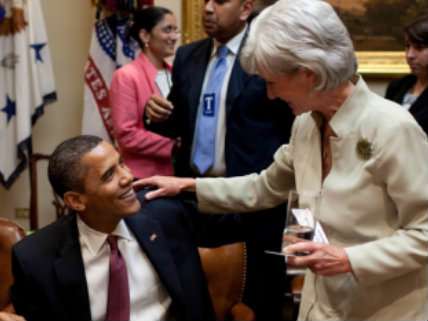The Administration's Continually Shifting Standards for Obamacare's Success

Calling Obamacare a success requires defining standards for what success looks like. In theory, those standards should be consistent over time.
But as National Journal's Sam Baker pointed out earlier this month, the administration has repeatedly backed off its own success metrics.
Just a few months ago, Health and Human Services Secretary Kathleen Sebelius said success would entail covering 7 million people this year. Now, the White House has disowned that standard for enrollment—and it hasn't come up with a new one.
President Obama touted HealthCare.gov, the main portal to shop for coverage, as the "Amazon" or "Expedia" of health insurance. Now the administration is calling it a win for the site to be "functional for the vast majority of users," and even that standard has been watered down since its debut.
And when the law passed, it was expected to reduce the federal deficit by about $210 billion over a decade. Now the projected savings are about half that, largely because one big program proved unworkable.
In a recent follow-up, Baker notes that the White House is once again downplaying one of its goals for the law—the necessity of getting a large-enough number of young and healthy adults into the exchanges:
White House officials consistently—and accurately—argue that the most important metric for Obamacare's success this year is the mix of young and old enrollees. But they're backing away from their own goals for that mix.
Getting young people into the system is critical to holding down premiums, and therefore to keeping each state's insurance market stable. Administration officials previously said their target was for young adults to make up about 38 percent of Obamacare enrollees. Now that standard is down to about 30 percent. Or maybe even 24 percent—where the mix stands now.
I'd add another item to this list, which is that the law was supposed to be popular. Before the law passed, Democrats predicted on multiple occasions that it would quickly become reasonably well-liked by the public. Then when opposition continued in the months after passage, Obamacare backers updated their argument, saying that in 2014 when the law's biggest benefits kicked in, the public would shift. But at least so far, that hasn't happened. If anything, the law has become less popular in the last year.
At this point, the White House has backed off so many of its own definitions of success that it's not clear what would constitute a failure. The administration seems to be defining Obamacare success if it continues to exist.


Show Comments (178)